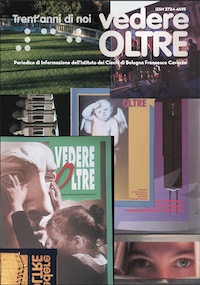For almost 20 years (since 2006), “Radio Oltre,” the Cavazza Institute’s station, has always been true to its original goal: to inform listeners not only about what happens at the Institute, but also provide news about information, technology, culture, and live events. Over the years, its programming has grown richer, with a schedule that now includes programs on travel, cooking, literature, philosophy, news, music, podcasts, and interviews: a lively mix of services and entertainment to support our regular audience plus over 1300 new listeners every month. So, it’s not just for the visually impaired, but transmits news for everyone. Many voices alternate in its studios on via dell’Oro in Bologna, and today we’ll listen to Luca Torrente, Radio Oltre’s head of programming.
Even though video is the most popular means of communication (especially social networks), the radio has always maintained its charm. Why?
It’s not just a question of charm, but also of usefulness. Listening to the radio is engrossing but it doesn’t monopolize the listener’s senses. It leaves room for imagination and, paradoxically, the experience becomes more absorbing and insightful. And in a certain way, I think listening with other people is much more pleasant. Monitors are getting smaller and smaller, increasingly private, but you listen to the radio with others.
An old song said that “if a radio is really free you like it even more because it frees the mind.” How free is "Radio Oltre"?
Fortunately, no one tells us what we can or can’t transmit. I have occasionally rejected some proposed programs, but these were always journalistic decisions.

Radio voices travel on waves that leave room for imagination. Is that perhaps why it’s still so popular?
Yes, as I said, when we listen we’re free to create, and therefore perhaps also free to remember what we hear. I think our main challenge is to make ourselves known in the mass of radio websites that are constantly growing and intensifying.
For the sight-impaired, the voice is the most immediate means of communication. In this sphere, how useful have recent technological innovations been?
Without a doubt, digitization, in this and in other spheres, has opened the medium to everyone. Anyone who has a PC, a microphone, and an internet connection can do radio. The average quality of what they transmit tends to suffer, but I don’t think that’s a problem: we’re free to what, when, and how to listen. It’s been this way for a while, but from the technical point of view, with prices lower and lower you can afford better and better equipment. But really, the result has been the same for almost 130 years.
What are your plans for the future?
"Radio Oltre" will grow a lot in 2024. The Cavazza Institute’s directors have decided to invest in the project, with an increase in paid hours for professional colleagues and an update in equipment. The goal is to network, invest in the realities that surround us and grow with them. "Radio Oltre" can be an asset for all of the realities like ours here in Bologna. Our doors are open to everyone who shares our mission of social and cultural promotion.





.png)